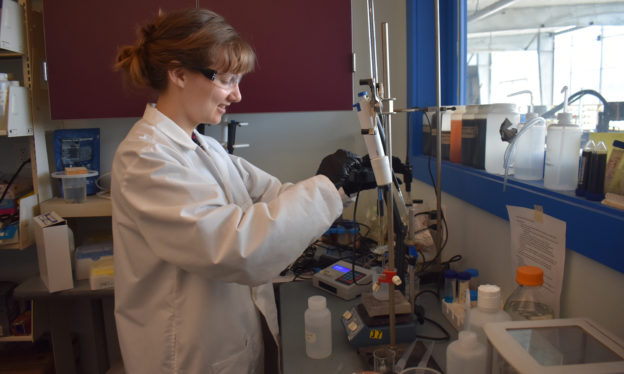Research

The Rich Earth Institute conducts original research examining the safety and efficacy of using urine-derived fertilizers in agriculture. View our research results here.
Current research projects investigate:
- The value of urine-derived fertilizer for growing hay. Since 2012, the Institute has been applying sanitized urine to hay fields and quantifying the crop yield. An initial research goal was to determine whether it is necessary to dilute the urine with water before application, to avoid injury to the crop. In 2014 we found no statistically significant difference in the yields of hay fertilized with diluted urine, undiluted urine, and synthetic fertilizer. Since that time we have continued to apply urine to hay, investigating application methods and best timing and conditions to maximize nutrient retention.
- The value of urine-derived fertilizer on other crops. We have partnered with area farmers to trial urine or urine in combination with other fertilizers and amendments, such as compost or compost tea, on a variety of crops including flowers, sweet corn, hemp, fig trees, and other trees and shrubs. Our research investigates effects on plant growth and development, soil health over time, and best application methods.
- The effect of pharmaceutical residuals in urine on crops, soil, and groundwater. In partnership with the University of Michigan, University at Buffalo, and the Hampton Roads Sanitation District, the Rich Earth Institute has studied the presence and persistence of a wide variety of pharmaceuticals when urine-derived fertilizer is used for growing fresh vegetables. Results to date indicate that although pharmaceuticals are taken up by plants, the amounts that remain in plant tissue are so small as to be unlikely to be of significance to human health. Research on soil health is ongoing.
- Methods for processing urine to increase its value as a fertilizer and reduce storage costs. Because urine contains so much water, it can be expensive to transport and store, and labor intensive to apply to farmland. The nitrogen in stored urine is in the form of ammonia, which is prone to evaporation and requires special handling during fertilizer application. To counter these challenges, we are experimenting with innovative freeze concentration methods to reduce urine volume, and processes to stabilize the nitrogen content. For example, we are assessing the feasibility of using whey and/or paper fibers to “bio-acidify” urine, as well as dairy manure and digestates, to reduce nitrogen losses.
- The impact on soil health of human-waste derived amendments (urine and biochar from biosolids) for sustaining ecologically sound agricultural systems. In partnership with Cornell University’s Extension Program on Long Island, we are exploring the use of biochar made from biosolids in combination with other soil amendments including biochar from biomass and human urine. Producing biochar from biosolids offers an opportunity to convert a waste into a value-added product that can increase soil organic matter in soils, help mitigate climate change, and improve crop production, while reducing the need for additional external inputs. The high-temperature conversion of biosolids to biochar eliminates many organic contaminants and immobilizes heavy metals. Biochar has also been shown to immobilize organic contaminants, such as the residual pharmaceuticals in urine. The project will address soil health impacts, plant growth and development, and farmer and consumer acceptance of these novel inputs.
- Social Research: Re-thinking how we use our human “waste” involves social and cultural transformation as well as technical innovation. To better understand the experiences, concerns and ideas emerging from everyone involved (and that’s everyone!), we conduct interviews, listening sessions and dialogue groups with farmers, legislators, environmental advocates, planners, waste-water treatment system operators, soil scientists, agricultural educators, fertilizer industry professionals and members of the “general public.” This research guides us as we develop educational materials and methods to overcome perceived stigma (so far we’ve found there is less than you might think), and informs our technical team as we research the most effective methods to divert urine from the waste stream and provide a product that farmers and consumers value and trust. Over time, we are also documenting the experiences and changes of behavior and attitudes among participants in our urine nutrient reclamation project in Brattleboro, our new depot in Bellows Falls, and other “early adopters” of urine recycling including a wide diversity of home gardeners.

